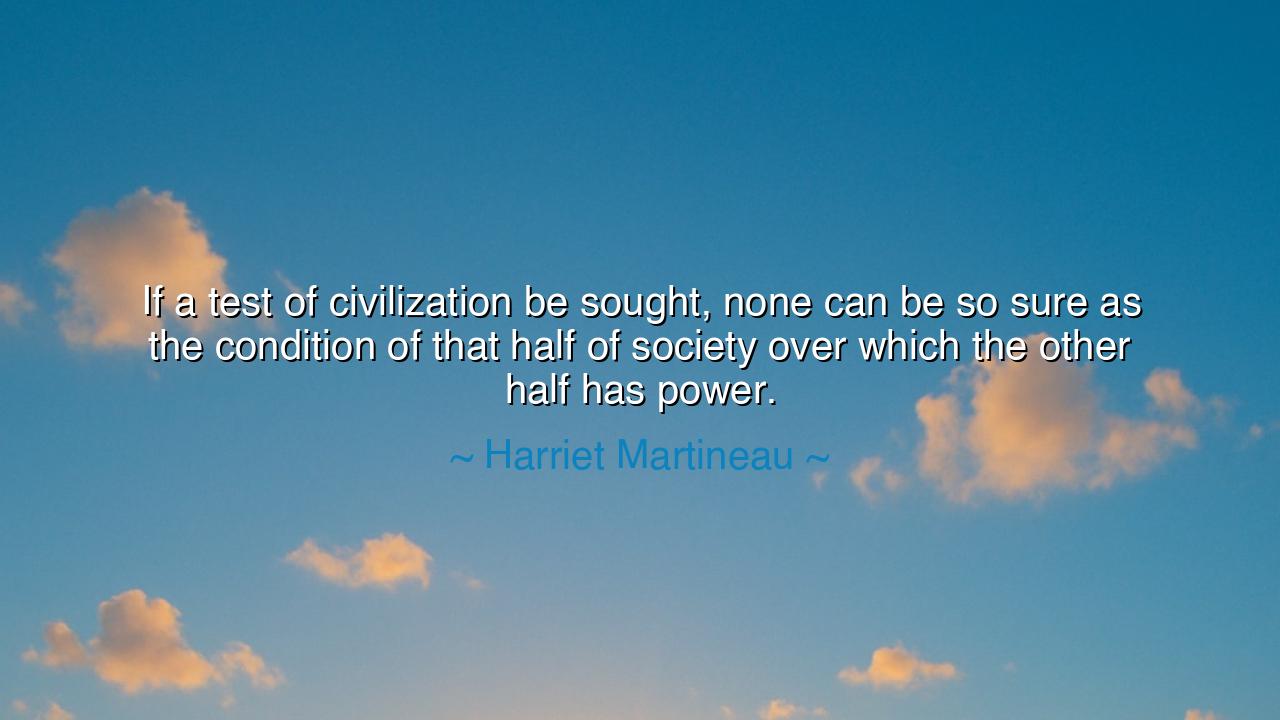
If a test of civilization be sought, none can be so sure as the
If a test of civilization be sought, none can be so sure as the condition of that half of society over which the other half has power.






Hear the voice of Harriet Martineau, the pioneering thinker and fierce observer of human affairs, who declared: “If a test of civilization be sought, none can be so sure as the condition of that half of society over which the other half has power.” These words rise like a beacon across the ages, reminding us that the greatness of any people cannot be measured by their monuments, their armies, or their wealth, but by how they treat those who are most vulnerable, most subject to the sway of others’ authority. True civilization reveals itself not in the strong, but in the fate of the weak.
Martineau, often called the first female sociologist, lived in an age when women, the poor, and the enslaved were denied equal rights. She saw clearly that every society has its rulers and its ruled, its privileged and its oppressed. To examine the lives of those under power is to find the truest reflection of justice—or its absence. If half of society is crushed, ignored, or silenced, then no matter how advanced its science or splendid its art, that civilization is hollow, its foundation cracked.
History confirms her truth. Consider ancient Sparta, lauded for its discipline and valor. The free warriors were celebrated across the world, yet their greatness was built upon the backs of the helots, an enslaved people forced to labor, humiliated, and brutalized. By Martineau’s measure, Sparta was not a shining civilization, but a deeply flawed one, for the greatness of the few depended upon the suffering of the many. To test a people, look not at their victors, but at their victims.
Contrast this with the movement to abolish slavery in the 19th century. Nations such as Britain, after centuries of profiting from human bondage, at last began to awaken to the moral truth Martineau articulated: that no civilization can call itself just while denying humanity to millions. The long struggle for emancipation revealed that the true test of progress was not ships on the seas or factories in the cities, but whether men and women would extend freedom and dignity to those over whom they had long held power.
O seeker of truth, reflect deeply on this: the worth of a nation lies not in how it treats its strongest, but in how it treats its weakest. The measure of a family is how it honors its children. The measure of a community is how it embraces the poor. The measure of a society is how it uplifts women, minorities, and all who once were pushed aside. For every person entrusted with power holds in their hands not only privilege, but the destiny of those beneath them.
Let your spirit be moved to action. If you would build a true civilization, use whatever power you hold not for domination, but for protection, for uplift, for justice. In your home, honor those who depend on you. In your work, support those whose voices are often unheard. In your nation, fight for laws that protect the vulnerable rather than exploiting them. For in lifting the oppressed, you raise the whole of society; but in crushing them, you doom even the powerful.
In practice, look with clear eyes at your community. Ask: who here is overlooked? Who is silenced? Who bears the weight of another’s authority without dignity or fairness? Work to ease their burden. Offer respect where contempt has long been given. Demand equity where inequality reigns. For Martineau’s truth endures: the surest test of civilization lies always in the condition of the oppressed.
So I say unto you: heed the wisdom of Harriet Martineau. If you would know the soul of a people, look not to their palaces but to their prisons, not to their rulers but to their subjects, not to the powerful but to the powerless. For in the treatment of the least lies the proof of the greatest. And in this measure, you will find not only the health of a society, but the very soul of mankind.






AAdministratorAdministrator
Welcome, honored guests. Please leave a comment, we will respond soon